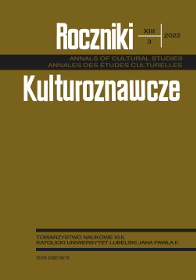ZACHĘTA DO MAKROBIUSZA. TRANSMISJA IDEI FILOZOFICZNYCH W KULTURZE
ENCOURAGEMENT TO MACROBIUS: TRANSMISSION OF PHILOSOPHICAL IDEAS IN CULTURE
Author(s): MAŁGORZATA Kowalewska-HarasymiukSubject(s): Aesthetics, Ancient Philosphy, Philosophy of Middle Ages, Philosophy of Mind, Philosophy of Religion, Cultural Anthropology / Ethnology
Published by: Towarzystwo Naukowe KUL & Katolicki Uniwersytet Lubelski Jana Pawła II
Keywords: antiquity; Middle Ages; Neoplatonism; theology; anthropology; God; mind; worldsoul; human being; image of the world; commentary; hypostasis;
Summary/Abstract: The article presents a philosophical and literary work which, despite its compiler character, played an important role in the history of culture. Thanks to him, important ideas of ancient philosophy were transferred to another era, that is, the Middle Ages. This work is a commentary on the VI book of De re publica by M.T. Cicero of A.T. Macrobius: Commentarii in Ciceronis Somnium Scipionis. This piece was for a long time the only trace of the mentioned piece by Cicero. It was also one of the main sources by which the ideas of Platonism and Pythagoreism as well as elements of ancient astronomical, musicological and mathematical doctrines reached the Middle Ages. This work was commented on very often by medieval scholars and is present in the minds of many of them. The numerous issues raised by Macrobius met with the interest of authors who know his Commentum. They took up macrobian threads and developed and transformed them according to their own way of thinking. Macrobius’ comment was repeatedly rewritten and commented on in the Middle Ages, as evidenced by the number of preserved manuscripts. In this article, I want to present an initial outline of the theological, anthropological and psychological views mediated by the commentary on the transmission of the Middle Ages.
Journal: Roczniki Kulturoznawcze
- Issue Year: 13/2022
- Issue No: 3
- Page Range: 5-34
- Page Count: 30
- Language: Polish

